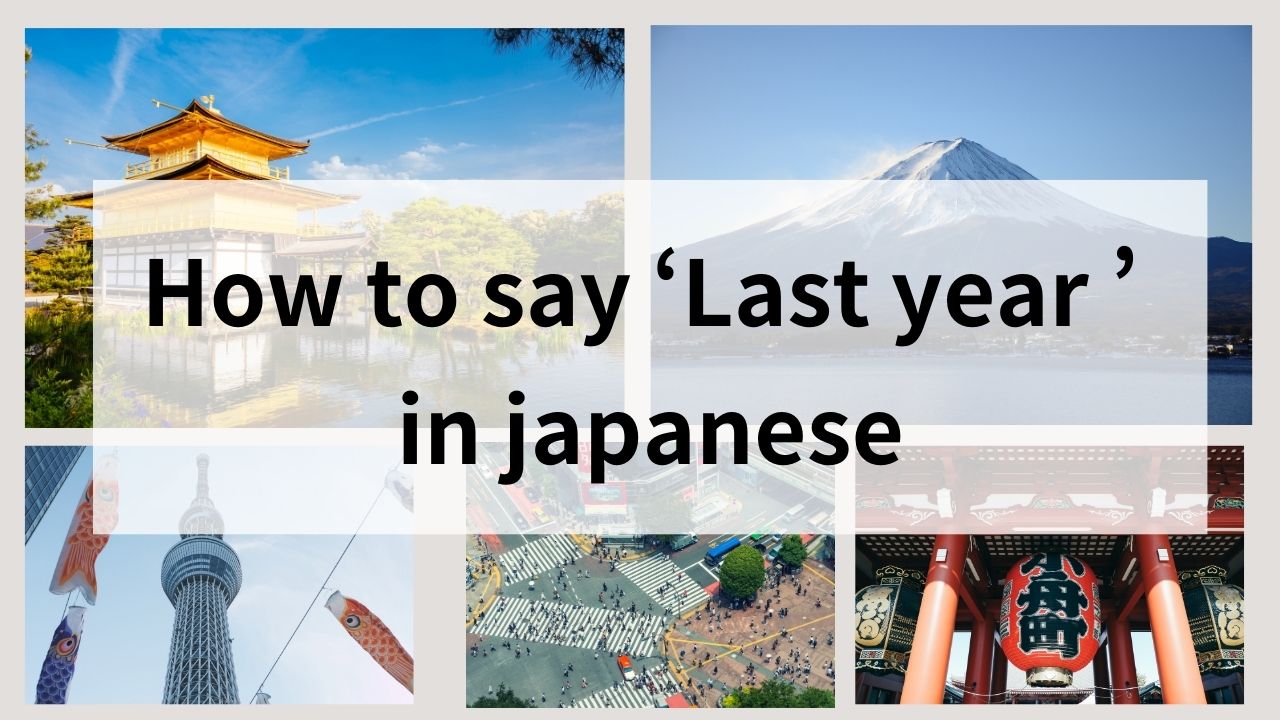Are you curious about how to say “last year” in Japanese? Understanding how to express time in a different language can enhance your communication and help you connect with the culture. This guide will explore the Japanese phrase for “last year,” its usage, and cultural context.
How Do You Say “Last Year” in Japanese?
The Japanese phrase for “last year” is 昨年 (さくねん, sakunen). This term is commonly used in both spoken and written Japanese, especially in formal contexts. It encapsulates the idea of the preceding calendar year and is a useful phrase for discussing events, achievements, or experiences from that time.
The Japanese Word for Last Year: Sakunen (昨年)
“Sakunen” is a term you will encounter frequently in various situations, including conversations, news reports, and academic discussions. For example:
- 昨年のイベント (Sakunen no ibento): “Event from last year.”
- 昨年の成果 (Sakunen no seika): “Achievements from last year.”
- 昨年は大変でした (Sakunen wa taihen deshita): “Last year was tough.”
Kanji for Last Year: 昨年
The kanji for “last year” is 昨年, which consists of two characters: 昨 (さく, saku) meaning “last” or “previous,” and 年 (ねん, nen) meaning “year.” The combination of these kanji conveys the specific meaning of the year that has just passed. This term is essential in discussions about time, statistics, and reflections on past experiences.
Does “Last Year” Work in Japanese?
The English phrase “last year” is commonly understood in Japan, especially among those familiar with English or international contexts. However, using the Japanese term 昨年 (sakunen) is always a safer choice for clarity and effectiveness in communication. In terms of comprehension, we can rate its recognition as:
- Rating: 5 – Well understood (80-100% of people)
Rating Details
Understanding the 5-Point Rating for English Words in Japan
The following ratings help explain how English words are typically understood in Japan. The scale is based on context, familiarity, and the target audience.
- 5 - Universally understood (80% or more):
Words that are widely adopted into everyday Japanese, such as "coffee" (コーヒー) or "computer" (コンピューター). These words are part of the standard vocabulary and are recognized by nearly everyone. - 4 - Generally understood (60-80%):
Words that are familiar to most people but might require context for full comprehension. Examples include terms commonly used in specific industries or by younger generations. - 3 - Understood in half of the cases (40-60%):
Words that depend heavily on pronunciation or context. For example, technical terms or less common foreign words that some people may not immediately recognize. - 2 - May not be understood (20-40%):
Words that are unfamiliar to most Japanese speakers unless they have significant exposure to English or specific cultural contexts. These words are often better replaced with their Japanese equivalents. - 1 - Rarely understood (20% or less):
Highly specialized or obscure terms that are unlikely to be recognized by the general public. Clear communication requires the use of Japanese vocabulary or additional explanation.
This rating system provides a practical guide for determining when and how to use English words effectively in Japan. Understanding the audience and context is key to ensuring clear communication.
Using “sakunen” ensures that your message is clear, particularly in formal or professional settings. While “last year” may be recognized, “sakunen” carries the weight of cultural context and linguistic accuracy.
Cultural Significance of Last Year in Japan
In Japan, the concept of reflecting on the past year is culturally significant, often tied to traditions and rituals. Many people engage in practices such as “Nengajo” (年賀状), which are New Year’s cards reflecting on the previous year and sharing hopes for the new one.
Reflection and New Year Traditions
During the New Year period, it is common to reflect on the previous year, discussing both challenges and successes. This practice is deeply embedded in Japanese culture, emphasizing the importance of growth and renewal. The phrase 昨年の反省 (sakunen no hansei), meaning “reflection on last year,” is often used in this context.
Last Year in Japanese Folklore and Literature
The concept of time and reflection is also present in Japanese literature and folklore. Many stories emphasize the cyclical nature of life, where the past informs the present. This understanding is integral to appreciating the Japanese perspective on time.
By recognizing the significance of “昨年,” learners can better appreciate how Japanese people view their past and future, enhancing their understanding of the culture.
Practical Applications of “Last Year” in Japanese
Understanding how to use “last year” in Japanese can help you navigate conversations, express thoughts clearly, and engage with cultural practices.
Talking About Last Year in Daily Conversation
Here are some examples of how “sakunen” is used in everyday conversation:
- 昨年は旅行に行きました (Sakunen wa ryokou ni ikimashita): “I traveled last year.”
- 昨年の仕事は忙しかったです (Sakunen no shigoto wa isogashikatta desu): “Work last year was busy.”
Last Year-Related Idioms or Expressions
While there are not many idioms specifically mentioning “sakunen,” the concept of reflecting on the past is prevalent in Japanese culture. Here are some expressions that symbolize this idea:
- 去年の雪は去年のうちに (Kyonen no yuki wa kyonen no uchi ni): Literally “last year’s snow is left to last year,” meaning one should not dwell on the past.
- 昨年の反省を生かす (Sakunen no hansei o ikasu): “Make use of last year’s reflections,” emphasizing the importance of learning from past experiences.
These expressions reflect the cultural value placed on learning from the past, which is crucial for personal and communal growth.
FAQs
Here are some frequently asked questions about “last year” in Japanese culture and language.
How Do You Write “Last Year” in Japanese?
The phrase “last year” can be written in kanji as 昨年 (さくねん, sakunen). It is formal and widely accepted in written and spoken language.
Is “Last Year” a Common Expression in Japan?
Yes, “昨年” is a common expression in Japan, used frequently in various contexts, including casual conversations, business discussions, and media reports.
Conclusion
“Last year,” or “昨年 (sakunen)” in Japanese, is an essential expression for reflecting on the past and understanding cultural practices tied to time. By learning how to use this phrase, you can enhance your communication skills and gain deeper insights into Japanese culture and values.








